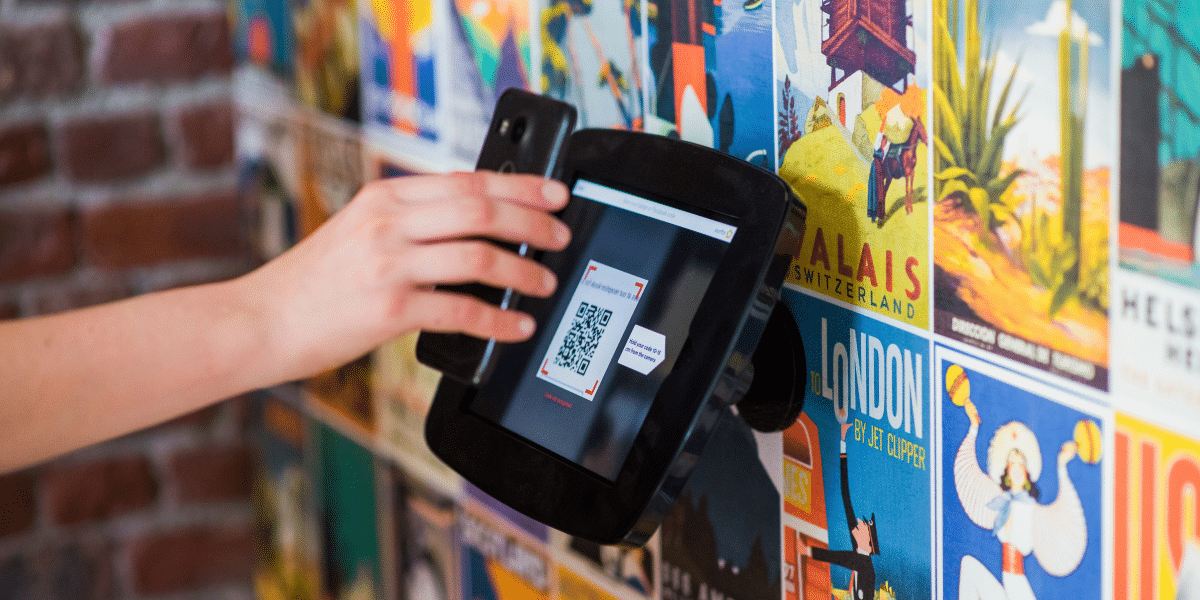Image commercially licensed from Unsplash
The fuss around QR Codes is real. It has gone above and beyond its original purpose to deliver something extraordinary to its users. And yet, it is a grey area when it comes to QR Code privacy and tracking. As the use of QR Codes becomes increasingly prevalent, concerns about data privacy and tracking implications are guaranteed to rise.
With tons of QR Code generators available out there, both free and paid, consumers need help recognizing and understanding the potential risks associated with their usage. So, we decided to consult an expert and put the mounting questions and concerns to a halt.
In this article, we dig deep into QR Codes, data privacy, and related concerns with the help of Ravi Pratap Maddimsetty, Co-Founder and Chief Technology Officer at Beaconstac HQ.
QR Codes and their Growing Popularity
QR Codes have witnessed a surge in popularity in recent years due to their versatility and convenience. These two-dimensional barcodes can be easily scanned by smartphones, providing people with instant access to various types of information, such as websites, contact details, product details, and more.
It’s unlikely to see packaged products in the grocery store without a QR Code. Why? Because QR Codes are attractive, interactive, and ubiquitous. They are an effective and efficient technology to adopt, and probably the easiest one, too.
Ravi Pratap: “We are merely scratching the surface of the immense potential offered by QR Codes. Beyond their current applications, they possess remarkable capabilities that continue to evolve. It was initially designed for the function of tracking in the manufacturing industry. Now, they have become a fundamental technology used by financial institutions, FMCG and marketing, and advertising industries for secure transactions and information exchange. We are standing at the beginning of a transformative journey, and there are countless exciting developments on the horizon. Undoubtedly, the future of QR Codes holds even more promise and innovation.”
Understanding the reasons behind this growing popularity is essential to grasp the implications of using QR Codes for tracking and data collection.
Exploring the Potential Benefits of QR Codes
The benefits of using QR Codes are many, and they can vary by the industry or use case. However, a few common positives of using a reliable QR Code generator came to light in our conversation with Ravi Pratap. So, before we dive into the implications of using QR Codes, let’s explore these benefits.
-
Enhanced User Engagement
Scanning QR Codes goes beyond simplicity—it’s an interactive experience that forges a stronger bond between businesses and their audience. Users unlock a world of information, exclusive offers, and enticing promotions with just a scan. This is a seamless engagement, and it allows businesses to captivate their target audience effortlessly.
Ravi Pratap: “At the same time, the engagement factor of QR Codes is unparalleled. In the realm of modern marketing, QR Codes have emerged as a trendy and highly customizable tool that empowers brands to create truly unique experiences. Brands can now effortlessly capture the attention of users and ignite a genuine sense of curiosity within them, nudging them to eagerly scan the code for what awaits.”
-
Efficient Data Collection
Ravi Pratap: “QR Codes have become essential for both marketing and non-marketing purposes, benefiting both users and businesses alike. They are not just a way of sharing information but also a form of collecting valuable data and insights about consumer behavior, preferences, and engagement. This is where QR Code tracking and analytics come into action. Using this information, you can gain a better understanding of their target market, optimize marketing campaigns, and personalize the customer experience.”
-
Versatile and Scalable
QR Codes are one of the most scalable and versatile marketing technologies. It’s extremely flexible, making it easy for businesses to adapt to different strategies and objectives. The fact that it is not limited to specific sectors and can be integrated into various marketing materials, products, or digital platforms is worth mentioning. But that’s not all.
Ravi Pratap: “They have a wide user base, making it possible for businesses to target a large audience. Now, QR Code scanning apps are readily available on smartphones, and users can easily access and interact with QR Codes, further enhancing their scalability as a marketing tool. This is what makes them perfect for businesses of any size.”
The Concerns: Privacy and Data Collection
With all the convenience QR Codes offer, many users worry about several associated concerns. The most common concerns included:
- Unverified sources: Anyone can create and place QR codes, including malicious actors. Scanning a QR Code from an unverified source may lead to accessing fraudulent websites, downloading malware, or falling victim to phishing attacks.
- Data tracking and profiling: Companies may use QR Codes to track user behavior and collect data, such as location, device information, and browsing history. This information can be used to build detailed user profiles, which may raise privacy concerns if not handled transparently and securely.
- Lack of control over data sharing: Users may not always be aware of the extent to which their data is being collected or shared when scanning QR Codes. Without clear consent and control mechanisms, personal information can be shared with third parties without the user’s knowledge or explicit permission.
So, how, with these long-standing concerns from the user’s end, can businesses leverage QR Codes?
Ravi Pratap: “These concerns are indeed valid and have been witnessed in numerous instances of QR Code misuse. When you use a secure QR Code solution with robust regulatory policies and features, you can effectively address these concerns. Nevertheless, it is important to note that QR Code solutions alone cannot provide users with comprehensive information regarding the collection and usage of their data. This responsibility lies with the business itself. It is imperative for brands to proactively reassure their users regarding the specific types of information being collected through QR Codes, the underlying purpose for such data collection, and how this information is utilized within their operations. By prioritizing transparency and clear communication, businesses can foster trust and address privacy concerns associated with QR Code usage.”
Strategies for Mitigating Data Privacy Risk
Data privacy concerns with QR Codes are no different than the ones users can face while visiting a website or downloading an app and sharing their contact information. However, there are a few steps businesses can take to mitigate data privacy risks and give the scanners the assurance they need to scan without worry:
-
Being Transparent is Step One
Businesses should communicate their data collection and usage policies to users before they scan a QR Code. Information about the type of data collected, how it will be used, and whether it will be shared with third parties helps establish trust.
-
Use a Secure QR Code Generator
Finding a safe and secure QR Code maker shouldn’t be that hard, as a good solution will always want to convey to its customers the steps it has taken to protect its data and that of its end users. Look for solutions that are GDPR and CCPA-compliant.
The GDPR sets stringent requirements for data collection and processing, emphasizing the need for users to provide explicit and affirmative consent before their data can be collected or utilized. Similarly, the CCPA focuses on giving consumers control over their personal information. It mandates that businesses allow users to opt out of having their data disclosed or sold to third parties.
Ravi Pratap: “Beaconstac, as a leading QR Code solution provider, prioritizes data privacy and security. With SOC-2 and GDPR compliance, we ensure the integrity of user scan behavior, swiftly detect phishing URLs, and maintain data accuracy. Beaconstac also offers enterprise Single Sign-On (SSO), custom domain integration, and white label functionality, providing an added layer of branding assurance, guaranteeing that users recognize the authenticity of the QR Codes they scan, as they are exclusively associated with your brand.”
-
Opt-in Consent
Users should be able to explicitly consent to data collection and decide which permissions they grant when scanning QR Codes. Implementing an opt-in mechanism ensures that users have control over their personal information.
-
Anonymization and Data Minimization
Businesses should adopt practices that minimize collecting and retaining personally identifiable information (PII) through QR Codes. Collecting only essential data and anonymizing it whenever possible helps protect user privacy.
Future Trends and the Evolution of QR Codes in Data Collection
QR Code standards are evolving; some have built-in security measures, such as digital signatures, encryption, and verification mechanisms. Going forward, we can expect to see these features as a standard in all QR Code generators. This will help combat fraud and protect user privacy.
Moreover, you can expect to see a rise in QR Code adoption with the increased usage of smartphones. With this, governments and regulatory bodies will increasingly recognize the importance of data privacy and enact regulations to protect consumer information. Businesses can indeed continue to utilize QR codes for data collection. Still, they must stay informed about these regulations and ensure compliance by choosing the right QR code generator to help businesses maintain user trust and avoid potential legal repercussions.
Key Takeaway
Concerns surrounding data privacy and tracking implications cannot be ignored. Businesses and individuals must prioritize privacy and implement strategies to mitigate privacy risks associated with QR Codes. Ultimately, QR Codes have the potential to continue driving innovation and convenience, but their responsible and privacy-conscious use is essential for a sustainable and trusted QR Code ecosystem.

















